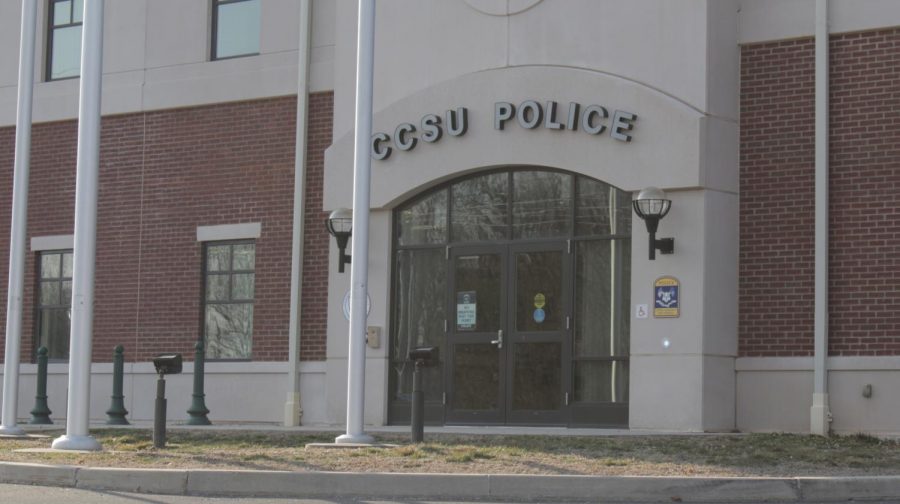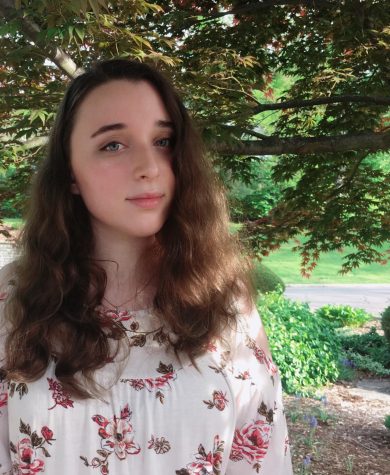Lawsuit Alleges CCSU Officers Engaged In ‘Sexual Activity’ With Students, ‘Ignored’ Colleague’s Rapes
March 20, 2019
Editor’s Note: This article contains graphic depictions of violent sexual assault.
A federal lawsuit is alleging that male officers in the Central Connecticut Police Department “[engaged] in sexual activity” with CCSU’s female students.
It also alleges that former CCSU Police Officer Curtis Lollar raped a former female CCSU police officer on three separate occasions while her superiors “ignored” and “covered up” all sexual misconduct incidents within the department.
The lawsuit, filed on March 19 in the United States District Court in the District of Connecticut by the former CCSU female officer, identified as “Jane Doe,” is against CCSU, Lollar, Chief of Police Gregory Sneed, Lieutenant Edward Dercole, Lieutenant Christopher Cervoni and Officer Ramon Baez.
Doe claims in the lawsuit that the “repeated acts of sexual violence” against her and the sexual misconduct within the CCSU PD are a result of CCSU’s “institutional failure” that she said “continues to this day, with its decision to allow its police chief, lieutenants and sergeants to remain in their leadership roles.”
CCSU President Dr. Zulma Toro said that her office is “reviewing the new allegations and will promptly investigate them” in a statement responding to the suit. She also said that some of the lawsuit’s claims “reiterated” the findings of last year’s independent investigation and that CCSU had already taken steps to “rectify many of them.”
The actions, Dr. Toro said, included the [Sept. 21, 2018] firing of Police Officer Curtis Lollar and the “changing the line of reporting of the police department,” which reports directly to the president’s office. Alongside this, new leadership was put in place for the Office of Diversity & Equity and the Office of Human Resources.
Dr. Toro also said “sexual harassment training” was increased and “new policies and procedures related to discipline and background checks were implemented.” A budget increase to the Police Department, as well as the hiring of three new officers, was also implemented.
In an updated e-mail sent out last Thursday, Dr. Toro said the university has “taken a number of significant actions to correct issues brought to light by our investigations last year…,” which includes the process of “retaining outside counsel to investigate these very troubling new claims.”
CCSU Officers “Did Not Limit Their Sexual Harassment To Words Alone” With Students:
The lawsuit cites that, in 2014, Officer Joseph Magarolas was discovered in a “dark, locked room” in the Student Technology Center, located in Marcus White, with a “teenaged” student worker. He then gave her a ride to the Manafort Lot.
According to a 2014 article by The Recorder, Magarolas was suspended for one day in the Fall 2013 semester after another student worker reported seeing Magarolas and a student worker together in the Marcus White Living Room with the lights turned off. In a Freedom of Information request filed by The Recorder to CCSU at the time, it was found that Magarolas had not logged his walkthrough of the building or the cruiser ride.
Through the FOI request, it was also found that Magarolas had been issued a disciplinary letter by the former chief human resource officer which warned he could be terminated for this instance and for the past “several occasions” he had had female students in the cruiser without logging it into the system.
The lawsuit also alleges that “another frequent catcaller,” former CCSU Police Sergeant Ramon Baez, “appeared to many to be having an affair with a female student.” Baez was promoted to acting sergeant and then to “full Sergeant” in 2017.
The lawsuit continues that CCSU male police officers had made “repeated” comments on CCSU female students’ breasts and buttocks. Doe reported that her male colleagues would often make comments such as, “Did you see what [a certain female student] is wearing today?” or, “Did you see the camel toe on [another female student] today?” Doe also said they “openly discussed” the women they wanted to “get with.”
Officers also “sexually harassed” female students, making comments such as, “Oh look at that ass” or, “Look at you. Look at that behind.”
Officer Lollar Raped Doe ‘Three Times’:
According to the lawsuit, Lollar raped Doe three times: twice in the summer of 2014 and once at Lollar’s house in the fall of 2016.
Both times in 2014, Doe was alone at night and on duty, patrolling a campus building that was “sparsely populated.” Both times, the lawsuit states, Lollar “silently stalked her” and “cornered her.” As she tried to fight him off both times, he “crudely laughed and used brute force.”
Doe’s request to then work different weekend shifts was granted on account that she did not “feel safe” with Lollar. However, no follow-up questions were asked, the lawsuit says.
The third incident of rape, the lawsuit says, took place at Lollar’s home during a “card party.” Though reluctant to attend, Doe said she feared Lollar’s “vengeance” if she did not come. Lollar also said he “promised” not to touch her again.
Upon arrival at the house, Lollar ripped the long pants and underwear she was wearing off of her. As he raped her, Doe claims Lollar “laughed that same crude laugh.”
CCSU PD Environment Lent Itself To A “Sexualized Environment,” But Superiors “Ignored” Or “Covered Up” Complaints:
Doe claims her breasts and buttocks were touched “repeatedly” by male officers, particularly Lollar and Baez, which she said contributed to a “sexualized” and “hostile” environment.
After the three incidents, Doe had reported to Dercole that she had been sexually assaulted, requesting that the matter remain confidential. When asked who raped her, Doe declined to provide names out of fear of retaliation. Dercole then notified Sneed.
According to the lawsuit, Sneed’s only response was “Ok, young lady.”
Sneed informed the CCSU Office of Diversity and Equity that the last time he “observed Doe distraught, he did not ask her about the sexual assaults” but instead sent her a Bible verse.
Additionally, when Doe reported Lollar’s sexual assault of a female department employee and his harassment of a student worker to Cervoni, he, the lawsuit says, “did nothing.” Moreover, when the student worker complained to Cervoni herself that Lollar was “following her around and staring at her buttocks,” he allegedly told her that Lollar was “checking” on her.
CCSU officers also, according to the lawsuit, continued to work alongside Doe as she was being “publicly humiliated” and left her without “back-up” when she needed it, “either significantly [delaying] their responses or even [failing] to respond at all.”
Doe also claims that retaliation did occur, including the humiliation and lack of back-up, as well as Baez separating her from her longtime police partner, who she said was the only one she could turn to at the time.
Doe suffered from such “severe mental and physical distress that she could no longer work,” the lawsuit cites.
The law firm Shipman and Goodwin concluded in an investigation into the CCSU Police Department that “sexual misconduct and assault was inevitable” in due to the environment in the police force and because those hired had “red flags” in their backgrounds.
The report also found that Sneed took the matter to CCSU Chief Administrative Officer Richard Bachoo and the head of human resources, but that no investigation took place.
The failure to conduct an investigation violated CCSU and Title IX policies, the report said, and Bachoo was subsequently placed on administrative leave.
Office Of Diversity And Equity’s “Horrific Interrogation” And Continued CCSU PD Retaliation:
In November of 2017, Doe reported the rapes to the Women’s Center within the Office of Diversity and Equity. Lollar was suspended with full pay and remained suspended with full pay until CCSU terminated him on Sept. 28, 2018.
An investigation followed Doe’s report that she alleges focused more on “challenges” to her credibility, “irrelevant details” and forcing her to “relive her rapes.”
According to Doe, investigators “questioned [her] memory and truthfulness and challenged her failure to report the incident over the radio system.” They also asked “invasive” questions, including “repeatedly” asking whether she had had a pregnancy test done. The investigators also characterized Doe’s claims that Lollar raped her as “‘alleged’ penetration.”
Doe said she broke down sobbing multiple times during the investigation.
After Doe’s report to the Office of Diversity, the lawsuit states that the retaliation against her by male officers at CCSU PD went on. In one case, Doe emailed Cervoni to speak with him about a threat Baez made against her; when she went to his office, Baez was already there, laughing with Cervoni, the lawsuit says. Baez then threatened her again, saying that he “could put a whole bunch of stuff in your record that you don’t know.”
On July 18, 2018, Doe said she could no longer handle the work environment and went on Family and Medical Leave.
She has been on leave from the department without pay since then. The lawsuit seeks economic, compensatory and punitive damages.





